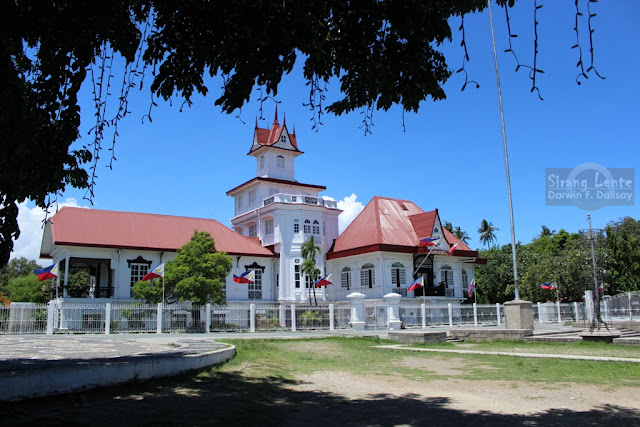
Jump to: About Aguinaldo Shrine | History | What to See | Opening Hours | How to Get There | Travel Tips | Nearby Attractions
🏛️ About the Aguinaldo Shrine
The Aguinaldo Shrine and Museum in Kawit, Cavite is the preserved ancestral home of General Emilio Aguinaldo, where the Philippine Declaration of Independence was proclaimed on June 12, 1898. The mansion—surrounded by a park and museum galleries—houses original furniture, memorabilia, and displays chronicling the Philippine Revolution. It’s a must-visit for history buffs and those who want to feel the heartbeat of the nation’s founding moment.

Historical Significance
The shrine played a vital role in Philippine history. From the iconic balcony, Aguinaldo waved the Philippine flag and declared independence from Spanish colonial rule. The house itself reflects both Filipino and colonial architecture, filled with hidden passages, antique furnishings, and revolutionary memorabilia.

📸 What to See at the Shrine & Museum
- Independence Balcony — where the Declaration of Independence was read on June 12, 1898.
- Grand Hall — impressive floors, antique furniture, and period décor.
- Aguinaldo’s Bedroom & Secret Passages — see displays and original furnishing.
- Museum Galleries — artifacts, photos, documents, and dioramas of the revolution.
- Family Crypt & Park — quiet grounds for reflection and photography.
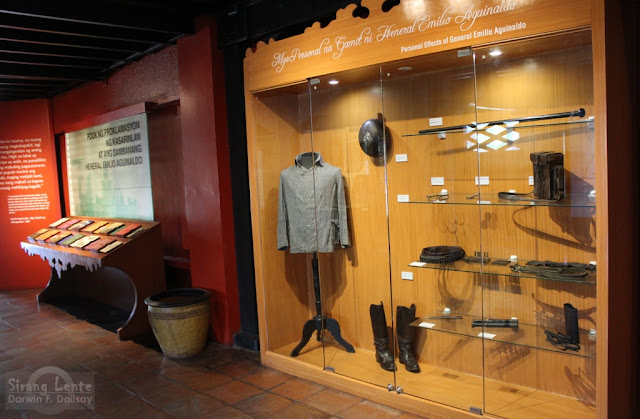

This sword was made in Toledo, Spain (1869) and was formerly owned by Spanish General Ernesto Aguirre. The sword fell when the Spaniards retreated from the fight against the forces of Gen. Aguinaldo in Imus, Cavite, in September 1896. Aguinaldo has the sword carved with the symbols of the Revolution, and made it his personal weapon.

At first, this concrete shelter was a short well that had an underground tunnel leading to the church. Soon, the well was cemented and turned into a mere shelter because strangers would go to the well and enter Aguinaldo's house.
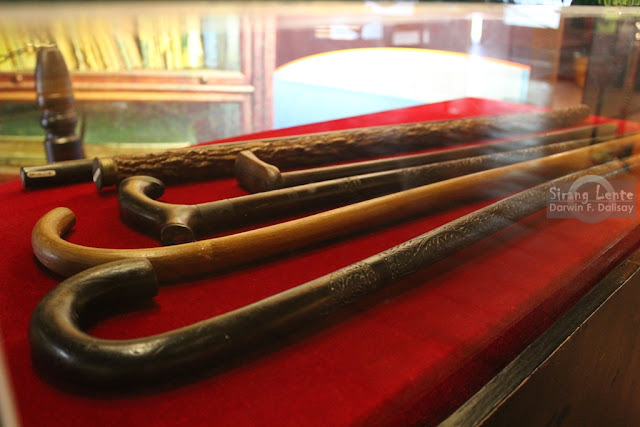










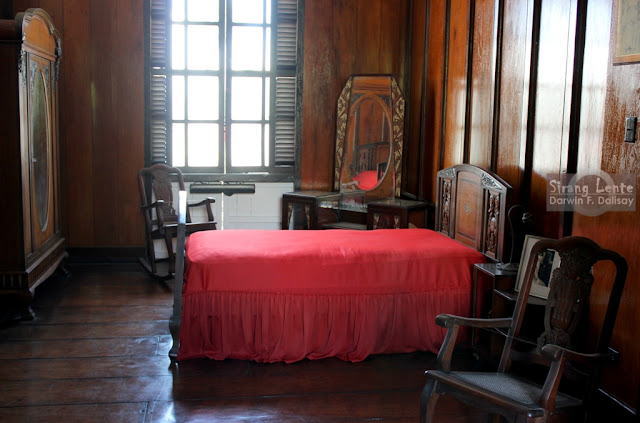
Let's talk in Tagalog na nga, matapos malibot at mabasa ang mga nakasaad bawat larawan sa ibaba, nagtungo naman ako sa ikalawang palapag na kung saan matatagpuan ang mga kuwarto ng mga anak ni Hen. Emilio Aguinaldo. Dito, agad kong nabanaag ang pagkaluma ng mansyon. Habang naglalakad sa may pasilyo, hindi ko maiwasan ang makaramdam ng takot dahil langit-ngit ng mga kahoy ang aking naririnig na nagpapatunay ng kalumaan nito, tunong na parang masisira.






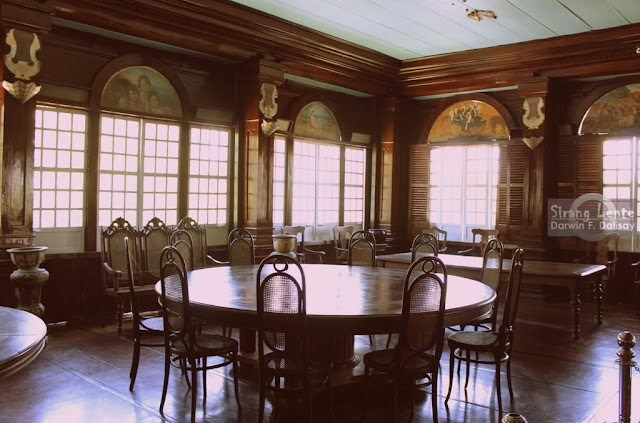
Sa kabuuan, ang ikalawang palagapag ay binubuo ng mga personal na kagamitan ng mga Aguinaldo, mula sa kanilang mga muwebles, upuan, aparador, hapag-kainan, salamin at iba pang mga kagamitang gawa sa kahoy. Ang kuwarto ng Heneral ang isa sa nakaagaw ng aking atensyon dahil sa mga lumang baro't saya na naka display. Sana ang mansyong ito ay ma-preserba pa ng mas maayos at malagyan ng mas malamig na temperatura dahil ang ikalawang palapag ay may kainitan na pwedeng makasira ng mga lumang gamit.
🚗 How to Get There
Address: Kawit, Cavite (along Aguinaldo Highway)
- From Manila by car: Take CAVITEX → exit Kawit/Noveleta → follow signs to Kawit town proper. Parking available inside the shrine complex. Use Google Maps or Waze. Or visit here to check affordable cars with drivers.
- By public transport: Take a bus/UV Express bound for Kawit or Noveleta. Ask the driver to drop you at Aguinaldo Shrine.
- From Cavite City/Bacoor: Tricycles and jeepneys connect to Kawit town center; the shrine is a short walk from the highway.
The shrine is located in Kawit, Cavite, about 30–45 minutes from Manila (depending on traffic). Parking is available near the entrance. In my case, in Baclaran, I rode a bus with Naic and Ternate Signboard and alighted at "Siyus," that's how the conductor pronounced it. Bus Fare: 25 Pesos. Then at Siyus, I rode in a mini bus passing by the Emilio Aguinaldo Shrine and Museum. Bus Fare: 10 Pesos.
To go back to Manila: By the entrance of the museum, I waited and rode a bus with the Lawton Signboard. Alighted in Baclaran. Bus Fare: 26 Pesos.
Travel Tips
- Admission is free, but donations are welcome
- Open from Tuesday to Sunday (usually 8:00 AM – 4:00 PM)
- Wear light clothing and comfortable shoes for walking
- Best visited in the morning to avoid crowds and heat
🕒 Opening Hours & Entrance
Typical hours: Tuesday–Sunday, 8:00 AM – 4:00 PM. Closed on Mondays (for maintenance and special events).
Admission: FREE (managed by the National Historical Commission of the Philippines). Donations accepted to support preservation.
Nearby Attractions
Final Thoughts
The Aguinaldo Shrine is not just a historical home — it’s a symbol of Philippine freedom and resilience. A visit here brings history to life and offers a meaningful experience for travelers, students, and patriots alike.
Visiting the Aguinaldo Shrine and Museum is a powerful way to connect with the Philippines’ struggle for nationhood. Standing on the Independence Balcony or walking the antique halls makes the history of June 12, 1898, feel immediate and personal. For travelers who love history or who want context for Philippine national identity, Kawit is a humble, meaningful pilgrimage that rewards curiosity and reverence in equal measure.
As someone who has visited all 82 provinces in the Philippines, I’ve created a complete guide to help you explore each one. Check out my Philippines 82 Provinces Travel Guide here.

No comments:
Post a Comment
Enter Comment Below: